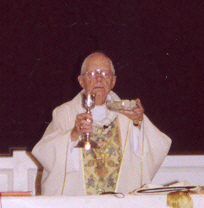
Return to
Index The Catholic Faith
Return to
Level Three Topic Index
Home Page
As a sacrament, we think of the Eucharist as a holy meal which Jesus told us to celebrate in memory of him. The Mass looks like a meal for it has a table (altar) covered with a cloth, bread, wine, water, and people praying, eating, and drinking together as one family in Christ.

But the Mass is also a Sacrifice. It has everything that is required for this act of worship to God: an altar dedicated for sacrifice, a priest who does the offering, and precious gifts to be offered. At the Last supper, Jesus made the Mass a spiritual reliving of his sacrifice on the Cross. How? By the words he used. Think about the most important words at Mass, the words of Consecration which come to us from Christ himself: This is my Body which will be given up for you. This is the cup of my Blood, the Blood of the new and everlasting covenant. It will be shed for you and for all so that sins may be forgiven.
See how they remind us of a sacrifice - body to be given up and blood to be shed? Of course Jesus was talking about his sacrifice on the Cross; but the Mass he gave us is closely connected with it. The Sacrifice of the Mass is not a new sacrifice or another sacrifice. It is really the same one that Jesus offered once for all upon the Cross. How can this be? Well, in both events there is only one priest doing the offering (Jesus) and there is only one victim or gift being offered (Jesus). So if you have the same priest and the very same offering, it must be the same sacrifice! This is hard to understand, but again we must remind ourselves that it is a mystery that we believe by faith alone.
The Sacrifice of the Mass
Of course there is some difference in the way the sacrifice of Jesus was offered on the Cross and in the Eucharist.
Upon the Cross, Jesus offered himself in pain and bloody suffering. In the Mass he offers his Body and Blood without pain, under the appearances of the consecrated bread and wine. But it is the same Jesus.
Also, upon the Cross Jesus offered his sacrifice by himself. At Mass he offers it with his Church - through the priest and the congregation.
Saint Paul reminds us that the Eucharist is a reliving of the sacrifice of the Cross. In his first letter to the Corinthians he tells us: "Every time, then, you eat this bread and drink this cup, you proclaim the death of the Lord until he comes (again)!" (1 Cor 11:26).
We can also see that the Mass is a sacrifice by looking at the prayers used during its celebration: Lord God, we ask you to receive us and be pleased with the sacrifice we offer you with humble and contrite hearts (Priest's Offertory prayer).
May the Lord accept the sacrifice at your hands, for the praise and glory of his name, for our good and the good of all his Church (People's Offertory prayer).
We offer you, God of glory and majesty, this holy and perfect sacrifice: the bread of life and the cup of eternal salvation (Eucharistic Prayer I).
Lord, may this sacrifice, which has made our peace with you, advance the peace and salvation of all the world (Eucharistic Prayer III).
Looking forward to his coming in glory, we offer you his body and blood, the acceptable sacrifice which brings salvation to the whole world (Eucharistic Prayer IV).
The Mass in Our Lives
The Mass, or celebration of the Eucharist, is the greatest worship we can offer to God. If we remember that being at Mass is very much like standing with Our Lady beneath the Cross of Jesus, we will be sure to pray with love and devotion.
You may hear someone say that he "doesn't get anything out of" the Mass. Well, first of all, we should never look upon the Mass as something we go to in order to "get" something. But we will get more from Mass if we put something of ourselves into it: If you want the Mass to help you grow in your friendship with Christ you must prepare yourself for it every week.
Used with the permission of The Ignatius Press 800-799-5534
Return to
Index The Catholic Faith
Return to
Level Three Topic Index
Top
Home Page